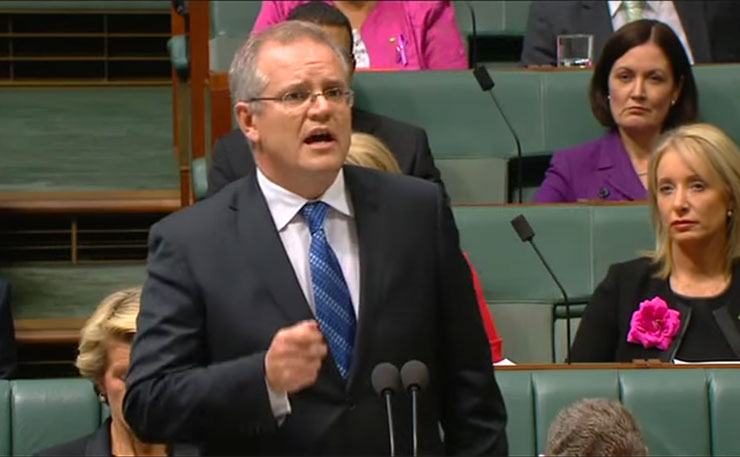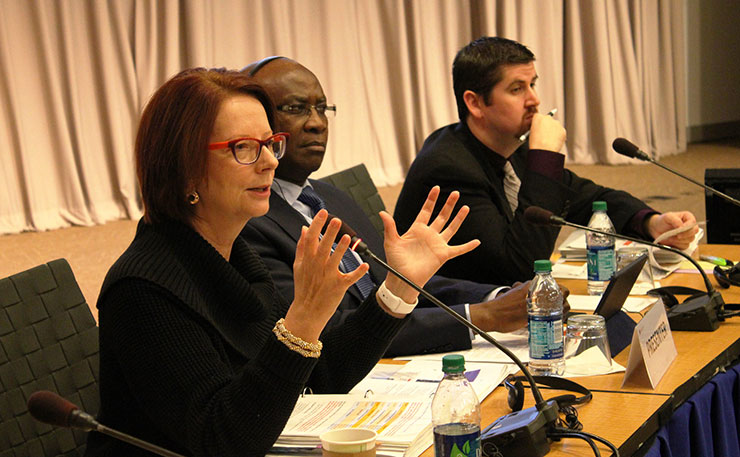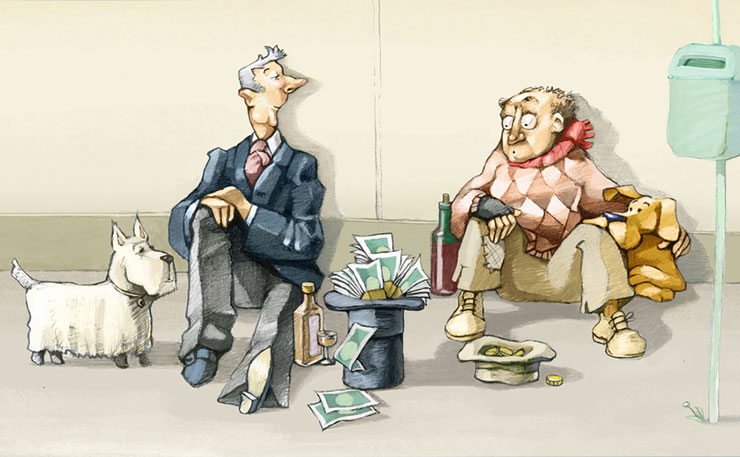Liam McLoughlin is ‘calling bullsh *t’ on sustained government efforts to increase the gap between rich and poor.
I do not believe we are living in a democracy anymore. We are living in a plutocracy in Australia. That is, government by the wealthy in the interests of the wealthy.
-Former Greens Leader Christine Milne.
Economic elites and organised groups representing business interests have substantial independent impacts on US government policy while mass-based interest groups and average citizens have little or no independent influence.
-Key conclusion from a 2014 Princeton study calling the US an oligarchy, not a democracy.
The Abbott/Turnbull government does have one thing going for it. It’s given Australians a comprehensive understanding of the word farce. Barring Greg Hunt’s achievements as Best Ever Minister In The Universe Times Infinity Plus One No Returns, there’s no better example than the “national conversation about tax reform”, or more accurately, “a national conversation about how to rob poor people and get away with it”.
Most Australians want more money spent on transport, health and education. Over 60 per cent think large businesses, mining companies and high income earners should pay more tax and 74 per cent agree the gap is too large between high and low incomes.
Most corporations and billionaires want tax breaks.
In a democracy, you’d think the overwhelming majority would hold sway. Luckily for the 1 per cent, we don’t live in a democracy.
There’s the democratic will and then there’s the will of Gina Rinehart. Or as argued by Senior Lecturer in Political Economy at the University of Sydney, Dr Tim Anderson:
“Public opinion runs a close second to the corporate imperative. Why else has government after government run the deeply unpopular policies of privatisation, cuts to social security, attacks on job security, regressive taxes and foreign invasions?”
We could have a genuine democratic debate about how to best get billionaires, mega-rich multinationals and fossil fuel companies to pay their fair share of tax. We could talk about how mining taxes, carbon taxes and company taxes are common sense ways to build necessary infrastructure, reinforce the fragile social safety net, and actually contribute to a fair and prosperous future. We could talk about tax reform in the interests of the millions of Australians who elect our representatives, rather than for the corporations and 1 per cent who actually run the country.

Instead we get a protracted bogus debate about increasing the GST so the government can further reduce income and company taxes. Instead we must suffer the slings and arrows of Turnbull’s nauseating econospeak, designed to hide the fact the looming GST increase and associated tax cuts would make 81 per cent of the top 5th of earners better off, but make 91 per cent of the poorest 5th of households worse off. It’s no surprise when you find out Treasurer Scott Morrison asked Treasury to model tax cuts which help high income earners the most and low earners the least.
While it’s a small mercy the government has temporarily backed off the GST, don’t think they won’t ram it through should they win the next election. Watch now as they scramble around for less transparent ways to rob the poor in their “tax mix switch”, a phrase Turnbull adopted when the focus groups told him a “bait and switch tax” would prove even more unpopular than increasing the GST.
Whatever the “tax mix switch”, you can guarantee it will just be variations on the same iniquitous Liberal theme: cutting services for the many, cutting taxes for the few. All the while infrastructure spending is at close to record lows and the Liberals slash and burn our public sector, now one of the smallest of all prosperous countries.
It’s a similar kind of politics for the 1 per cent in the United States that led a 2014 Princeton study to conclude the US is not a democracy, but an oligarchy – government not by the many, but the few.
Studying about 1,800 policies from 1981 to 2002, researchers found wealthy elites steer the country, regardless or against the majority of voters:
“When the preferences of economic elites and the stands of organised interest groups are controlled for, the preferences of the average American appear to have only a miniscule, near-zero, statistically non-significant impact upon public policy.”
In light of the recent history of local politics, few would bet against a similar finding here in Australia.
The last few decades have been an absolute cracker of a time in Oz if you run a company, if you’re rich, or if you bloody love overheating the planet.
Company tax rates have fallen from 49 per cent in 1986 to 30 per cent in 2016. The top income tax rate has dropped 20 per cent in the same period.
Compared to 40 years ago, the income share of the top 1 per cent has doubled while it has tripled for the top .1 per cent.
The government continues to fund the planetary suicide mission of the fossil fuel industry to the tune of $10 billion a year.
Australia’s effective tax rate for foreign multinational miners is 13 per cent.
Meanwhile 600 big public and multinational companies paid no tax in 2013-2014.
The number of billionaires in Australia has grown from 1 in 1988 to 27 in 2016. Turns out it’s heaps easier to become a billionaire if you both shape government policy and pay little to no tax.
Australian governments have been doing solids for the ultra-rich for about 30 years now. That’s not to say more progressive governments don’t occasionally try to do things a little differently.
In 2010, Kevin Rudd planned to use the 40 per cent mining tax called the Resource Super Profit Tax to raise $22.5 billion over the first four years. It only cost miners $27 million to kill the tax and bring down the Prime Minister.
In 2011, Julia Gillard introduced a carbon tax to force polluters to give up $7.6 billion a year, a pretty decent price for threatening the existence of civilisation. Again, enormous lobbying efforts helped abolish the tax and bring down a second Prime Minister.
Labor deserves some credit for at least attempting genuine tax reform, although clearly it’s far from immune from the sticky fingers of the plutocracy. The fossil fuel industry donated over $400,000 to Labor in 2014-2015, a comparable amount to donations to the Coalition. Kevin Rudd worked hard to supplicate the media/banking/mining nexus, while Julia Gillard followed the wishes of BHP Billiton, Rio Tinto and Xtrata to gut the mining tax.

This kind of influence is even worse inside the Liberal Party. At least some residual notion of fairness lingers inside Labor, mitigating the worst excesses of the oligarchy. The Liberal crusade to punish the poor and reward the mega-rich offers no such respite.
Tony Abbott, stuck on repeat, often said “Australia is open for business”. Witness free trade deals with Korea, Japan and China and the truly horrific Trans-Pacific Partnership.
Now with multimillionaire businessman Malcolm Turnbull as the new CEO, there should be few illusions about Australia’s status as a democracy. With Turnbull at the helm, Australia Inc is little more than an exciting business opportunity for the oligarchs. An excellent recent Guardian piece summed it up:
“Turnbull describes politics explicitly in business terms. Growth, agility, creativity and disruptive change are the future for Australia. No talk here of equality, freedom or social justice. That would be bad for business.”
We are left with two alternatives. We can settle in for two decades of Malcolm’s agility and innovation, truly exciting euphemisms for Liberal dogma: “Fuck the poor. Oh and fuck the environment while you’re at it.”
Or we can call bullshit and reclaim our democracy. We can call bullshit on the claim that as one of the richest nations on Earth, we can’t help the 2.5 million Australians living in poverty. We can call bullshit on the idea that billionaires should be getting tax breaks while 105,000 Australians don’t even have a bed to sleep in.
We wouldn’t be the first ones to do so.
Chief Economist at the Australia Institute Richard Denniss’s brilliant 2015 articles in The Monthly, called Spreadsheets of Power and Of Clowns and Treasurers, should be essential reading for any bullshit calling campaign. His pithy language strikes at the heart of the current system:
“The primary purpose of the econospeak that fills our airwaves, most of which is complete nonsense, is to keep ordinary Australians out of the big debates about tax, fairness, climate change and the provision of essential services. Econospeak is a great way to limit the options on our democratic menu. Would you like a small tax cut in services or a big tax cut and a big cut in services? You want to spend more money in health and education? You must be mad. Just imagine how “the markets” would react to such a suggestion.”
There are also those in Labor who are at least talking about the blatant reality of the oligarchy. Back in 2012, Wayne Swan wrote, “To be blunt, the rising power of vested interests is undermining our equality and threatening our democracy…. We see this obviously in the ferocious and highly misleading campaigns waged in recent years against resource taxation reforms and the pricing of carbon pollution.”
More recently, Labor senator Sam Dastyari said:
“There’s something fundamentally wrong and rotten with the entire (political) system almost regardless of where your political persuasions do sit. There are 10 companies that really wield the most incredible amount of power in Australia. What’s happening now is the entire political debate has become so dominated by the interests that they’re pushing and the agenda they’re pushing. And we’ve ended up with this complete crowding out of a proper political discourse in this country because there is one sectional interest that is so much louder than every other voice out there combined.”
The Greens have been calling bullshit for a while now. Here’s former Greens leader Christine Milne naming and shaming the plutocracy last year:
She says, “We have to restore the health of our democracy. We need to educate everyone, to put in up in lights, just how big business and wealthy individuals use their money and connections to take and retain power.”
Right on Christine, what else can we do?
We can learn from past victories, such as warding off the appalling 2014 budget and stalling contemporary plans for a GST increase. We can also be on high alert for future government plans to screw us.
More than this, we can encourage Labor and the Greens to learn from the immense popularity of Bernie Sanders and craft economic policy and political campaigns around reclaiming democracy from the oligarchy.
For the moment at least, let’s call a spade a spade. We live in an oligarchy, not a democracy.
And in the words of Labor politician Frank Anstey, writing in his 1921 book The Money Power: “No nation can be really free where this financial oligarchy is permitted to hold dominion, and no ‘democracy’ can be aught but a name that does not shake it from its throne.”
Donate To New Matilda
New Matilda is a small, independent media outlet. We survive through reader contributions, and never losing a lawsuit. If you got something from this article, giving something back helps us to continue speaking truth to power. Every little bit counts.





